As part of our wider appreciation of Springs and Wells and the religious associations connected with individual sites, we look at mythological and religious heritage. During our extended research it is apparent that religions and mythology have played an important role in the ascent of mankind. We now take a step back to understand this phenomena.
The idea of God and Heaven is one that has intrigued the human mind since the dawn of civilisation. Yet it is a concept that in its various forms has been instrumental in shaping human destiny. Religions and mythology have been created as a result. Mankind can then come to terms with this nebulous concept and direct it in a positive direction for human progress. Science has intruded into the debate in recent centuries and ideas have been modified and adapted as a result. Nevertheless the understanding of God and Heaven still varies considerably across the globe and requires an act of faith to totally take on board the belief. The continual march of science however continues to shed light on our understanding.
In recent decades there have been major advances in understanding the universe in which we reside. Inevitably there is an endless enquiry into whether there are other forms of life elsewhere in our solar system, galaxy or universe. There are only a few planets revolving around our particular sun in our solar system. We understand that we are the only planet with liquid water as a result of the radiation that earth receives from our sun. Others likely have water but it may be frozen or vaporised depending on whether the planet is colder or hotter than earth. Liquid water is essential for life in its many forms as we know it.
This raises the question, are there other planets similar to earth elsewhere? The answer is almost certainly yes. The criteria for a solar system that could contain planets capable of sustaining life can be hypothesised as follows. To create a time frame long enough for life to form the sun at the centre of the solar system must be 3 billion years old. It must be no larger than 1.5 times our sun as larger stars burn out too rapidly. The sun's iron content must be at least 50% enabling rocky planets to form. The sun must have a stable position within the galaxy to avoid inter-stellar collisions and dust causing extreme climate change. The star or sun must be stable to again avoid dramatic climate change on the planets. Finally the suns position must be located in a galaxy so as to give a stable gravity with minimal effect from other stars. (Turnbull, Carnegie Inst.)
There are millions of solar systems in our Milky Way galaxy and there are millions of galaxies in the universe. The likelihood that there are planets similar to earth revolving around different suns in different solar systems is mathematically very high. Similarly it is a mathematical certainty that some of these, where the criteria above are met, will have evolved life as we have on planet earth. Recent research from the University of Nottingham on images from the Nasa Hubble Space Telescope reveals 20 times more galaxies than previously thought, now estimated to be two trillion.(source Daily Telegraph 14 Oct. 2016,) With each galaxy containing vast numbers of stars, each with planetary systems, there are practically endless possibilities for planets that might sustain life.

Darwinians believe that life by the process of natural selection, fittest survive. This doctrine results in a process of evolutionary upgrading as life establishes itself. Early earth was not conducive to life due to instability and bombardment by asteroids. Recent discoveries of stromatolites fossils in Greenland however indicate that life was rapidly formed once earth had evolved to a stable state. Researchers from the University of Wollongong in Australian decoded fossils that are believed to be the oldest evidence of life ever discovered on earth. Dated at 3.7 billions of years old they are 220 million years older than the previous oldest fossil records. The implications of this discovery are that life was soon established on earth once stability ensued, suggesting that life, given the right conditions, could form as quickly elsewhere in the universe.
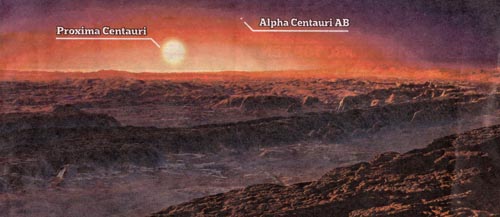
This point was illustrated in August 2016 when it was announced that astronomers had discovered an earth-like planet . It is named Proxima b and orbits Proxima Centauri, the closest star to our sun. It is 4.2 light years away and is 1.3 times the size of earth. The year here is only 11.2 days, the time taken for Proxima to orbit its sun but a combination of surface temperature and physical geography indicate that it could possibly support life. (source: Daily Mail 25 August 2016)
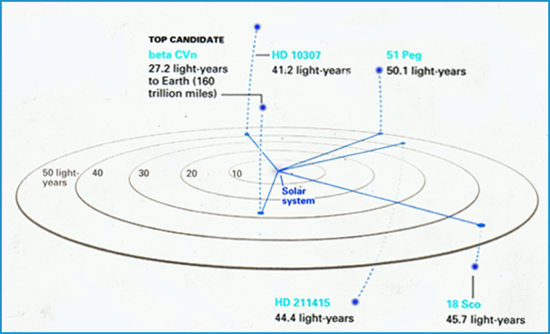
Other top candidates for a solar system for life include beta CVn. It is 27.2 light years from earth which equates to about 160 trillion miles. The above diagram suggests 5 such systems which may contain intelligent life with our solar system in the central position. (2006 National Geographic)
The next question is has life progressed to the point where it has science and technology as a tool in its survival similar to humankind on earth? It would not be unreasonable to assume that it had. Our science and technology is a few thousand years old. This is a fraction of a second in time in the life of the universe. There is therefore the possibility that life elsewhere would have developed for far longer its science and technology resources. We have seen in recent years the rate of change and innovation in earth's science and technology. This has dramatically affected our lives. Elsewhere, over a longer time period, science and technology may have developed into unimaginable realms with applications beyond our wildest dreams.
Would life elsewhere have developed interplanetary travel? Are there life forms looking to interact with us on earth? The laws of physics dictate that travel over light years would be necessary to arrive at another inhabited planet. To move a mass from one planet to another at will and then back again is essentially not practical over the extended distances of the universe, even if the life form has conquered the problem of time travel. However if your mass is zero or negative, this opens up the door to an alternative option of supernatural communication and parallel universes. At this point we move into the realms of science fiction because we are well beyond our present understanding.
This raises the issue - is supernatural or paranormal contact the root of our beliefs in God, Heaven and various mythologies? If so we can reinterpret all sorts of occurrences that have led to our beliefs in God and Heaven. We can explain everything from ghosts to spirits, prophets and mystics, spiritualists, regression, the strange happenings recorded in the Bible, even uncanny coincidences and premonitions. The ministry and ascension of Christ may have been the visitation of a supernatural messenger from elsewhere adopting a human body for the purpose. If we accept the notion of communication in another technology and dimension, it is straightforward to develop rational explanations for all we identify usually as related to God and Heaven.
The hypothesis is that we on earth are being interacted with by an intelligent and advanced interplanetary life form, using unimaginable science. For what purpose is another debate as follows.
Scientists now claim that humans do have souls and that several well respected authorities consider that the spirit is an external consciousness. One such relatively new theory of consciousness is known as Orch OR. It is based on the idea that the spirit is a complex amalgam of information created by individuals that transcends the body, existing at a quantum or sub atomic level. At the point of death the consciousness which is stored in microtubules within the body cells, transcends to the external reality. Here it is absorbed and consolidated in that alternative reality. In some near death incidents it appears that this consciousness departs the body but returns in the case of last minute resuscitation. Once the soul or consciousness has migrated to another existence, it is then positioned for future availability, whatever that might entail.
The material world we live in is in effect a stepping stone for the spirit to another reality of infinite proportion. The body dies having completed its role and the spiritual consciousness is immortalised. The management and control of this process may therefore be in the hands of an intelligence of unimaginable ability and knowledge which created the universe in which we live. Having departed the physical body, the consciousness can under certain circumstances interact with the living. As such it plays a role in managing our experience in life, perhaps even utilising the knowledge of the combined alternative reality to guide the living soul at a conscious or even unconscious level.
This account of quantum consciousness or spirit explains things like near-death experiences, astral projection, out of body experiences, and even reincarnation without needing to appeal to religious ideology. There is even the possibility that the consciousness gets recycled back into a different earthly being at some point, either by influence or by actual re-establishment in a new birth. In the meantime it exists outside of the physical world that we know, on some other level of reality and in another universe. This we call God and Heaven as a metaphor or conceptual framework within which to try and understand the meaning of our existence on earth. Each spirit brings the experiences and wisdom of its life on planet earth with it. This alternative reality is thus being continuously enhanced as spirits join its infinite bounds. Why? Is it to relay that wisdom back to us to enable us on earth to advance also, or is there a much grander motive for the creation, albeit incomprehensible to us earthbound mortals?
In 1983 Michel Gauquelin published "The Truth about Astrology". 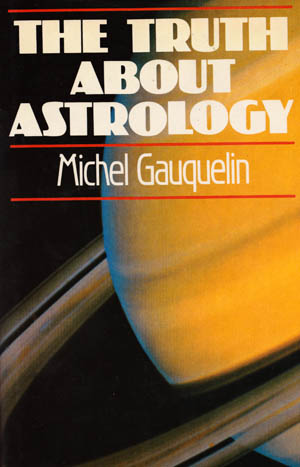 This summarised his extensive research over decades. He had set out to scientifically verify that the position of the planets at time of birth was significant in the development of that individual through life, a concept already used in astrology. In doing so he scientifically verified the role an external factor beyond earth that influenced the development of that individual.
This summarised his extensive research over decades. He had set out to scientifically verify that the position of the planets at time of birth was significant in the development of that individual through life, a concept already used in astrology. In doing so he scientifically verified the role an external factor beyond earth that influenced the development of that individual.
He began by collecting data on date, time and place of birth for an enormous number of individuals in France where such details are recorded. He then plotted the planet positions for each. The astonishing results were that individuals with specific skills such as doctors were born when particular planets were in the ascendant. He then went on to prove a definite mathematically significant link between time of birth and people at the top of particular professions. This led to a verification of celestial related heredity, temperament and personality. He denounced the signs of the Zodiac as mythology but was adamant about the moment of birth giving rise to characteristics in the individual's life.
If we look as Michel Gauquelin's work in the context of modern day thinking we can reinterpret that what he determined was that the consciousness or spirit enters the body at time of birth. It brings with it an empowerment for that individual. This in turn affects the development of that individual in life. This effect is related to planetary positions within our solar system. Gauquelin's lifelong research and findings were decried at the time as being inconceivable. How could the moment of birth possibly affect the individual's aptitudes in life? Only now can we appreciate what he actually achieved.
So where is this alternative reality or dimension where the consciousness or spirit can arrive from and eventual return to? Is this what religion calls Heaven?. We know that it is linked to the universe is some way. Returning to astronomy (as opposed to astrology) there is a major dilemma. Our understanding of the universe, its perceived continued expansion and the role of stars and galaxies etc. is a specialist science. Mathematical calculations and formulas seek to explain quantum theory, mass and gravity. However our current evaluation and understanding only works if we make a great assumption. That is that more than half of the universe comprises Dark Energy or Dark Matter of which we have little understanding. As a result the Dark has become a metaphor enabling us to progress in making scientific sense of the universe. Is this the parallel universe to which our consciousnesses or spirits emanate from and retire to? We can now start to suggest how heaven might work. This is the domain of a super intelligence that amalgamates the knowledge and experience of consciousness/spirit as a result of its conditioning on earth. We humans are just vehicles for this conditioning during our short lives. On our death our spirit returns to the alternative dimension albeit retaining the ability to communicate and influence in a way that is explained by psychics, the supernatural and religions.
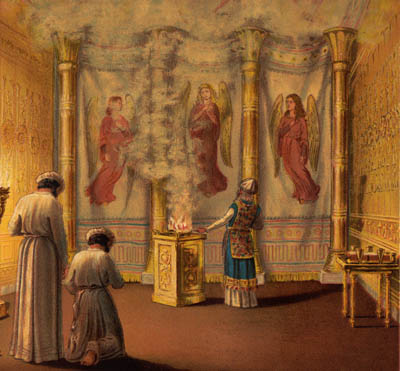
We arrive at a situation where all religions have their relevance. Religions recognise the supernatural source of influence, acting as it does as a master of ceremonies for humanity. Personalising the religion or mythology makes it even easier to comprehend, although the proven scientific explanations continue to evade us. Religions however have to adapt to scientific advancements to retain credibility. For example we now know that stars are celestial bodies surrounded by planets and not Gods in the heavens looking down on us. Illness is not a punishment from the Gods, merely a breakdown of human health that hopefully has a remedy in medicine. But what does the future hold for forthcoming generations?
The Logic of God
The universe and all it contains is temporary and in a state
of transition. Under the law of cause and effect something caused the creation
of the universe. God therefore arguably exists as creator. The Universe is a
highly complex structure. This state comes about by a process of evolutionary
management. If this was by design rather than by accident, then a super
mastermind originated and manages it which we label God. Since the
1960s, physicists have confirmed that the fundamental physical laws and parameters
of our universe are finely tuned, against all odds, to make our universe
capable of hosting life. Not surprisingly, many physicists have concluded that
this improbable fine-tuning points to a cosmic super intelligence. In addition,
molecular biology has revealed the presence, in living cells, of complex information
nanotechnology. This includes digital code in DNA and RNA, tiny, intricately constructed,
molecular machines which vastly exceed our own digital high technology in their
storage and transmission capabilities, perhaps implying the activity of a master
programmer at work in the origin of life.
Compared with the life of the universe, God is the one thing
that does not appear to have a shelf life. God is permanent. God is the
eternity within which the universe unfolds.
Whilst Science progressively explains the laws of nature and
physics which control the evolution of the universe, Science is man-made and
has a long way to progress. The alternative way of explaining the universe is
through religion. This provides a series of metaphors which by associating the
elements of the universal creation with day-to-day experience enables people to
cope with matters otherwise unexplainable. In the case of Christianity, Jesus
and the Bible provide a short cut to explaining the mysteries of God.
From an individual's perspective emotions such as love,
hope, fear, hate, guilt, greed, etc. are all encompassed in religions and
therefore are managed according to the doctrines of that religion. Religion
guides the individual with, in the case of Christianity, going to heaven as the
incentive to comply. In a similar way
the laws of the land dictate certain codes of behaviour with going to prison or
fines being the outcome of non-compliance.
Another aspect from the individual's point of view is
psychic communication and events. If God is the ultimate recipient of an individual's
psyche this suggests a vast accumulation of data embellishing the management of
the universe. One way in which we perhaps become aware of this is through
psychic events. Spiritual healing and prophesy and psychic contact with spirits
could be a means of inter-communication between those whose spirits are with
God and those on the earth. This could be
interpreted as a third means of influencing living people at both a conscious level
as well as at an unconscious level. Science still has much to explain.
Ultimately science will replace mythology when we discover all the mysteries of the Universe and life. This understanding will fundamentally alter our perceptions of what is life. Humanity will benefit from this advanced state because it will remove misinformation and misunderstanding. No longer will wars be fought based on religious conflict. Instead, a new harmony will ensue. Logical reasoning will supersede outdated religious arguments ameliorating the variations of religions that create tensions in society. Instead, mankind will hopefully have devised a system of governance that follows logical paths forward in a manner that it is impossible to imagine in our current state of knowledge. The prospect is good as mythology and science merge in a commonality. As with most things, we understand the universe has a limited life. Could it be that we are being put on the path of immortality? Like religions, the following metaphor enables us to understand what is occurring. In spring, there will be frosts and cold winds as well as warm sunny days. However, the everlasting summer will follow, provided we do not irrevocably sabotage this prospect and ourselves before it takes place.
Pictures:
Forget Me Not by Arthur Hughes (1832-1915)
History of the Earth.
Proxima b Its surface and sun from the Daily Mail 25 August 2016.
Stars Like Ours, National Geographic Dec. 2006.
Michel Gauquelin's book
Early religious worship B.C. Cassell & Co. London.
Updated September 2022.



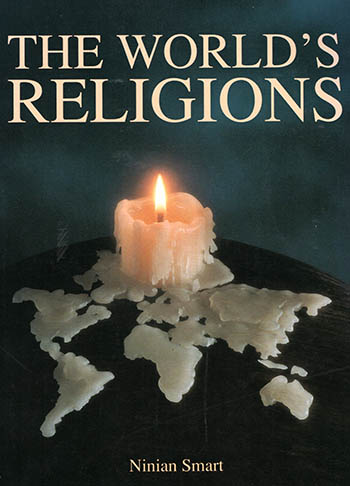



 This summarised his extensive research over decades. He had set out to scientifically verify that the position of the planets at time of birth was significant in the development of that individual through life, a concept already used in astrology. In doing so he scientifically verified the role an external factor beyond earth that influenced the development of that individual.
This summarised his extensive research over decades. He had set out to scientifically verify that the position of the planets at time of birth was significant in the development of that individual through life, a concept already used in astrology. In doing so he scientifically verified the role an external factor beyond earth that influenced the development of that individual.


